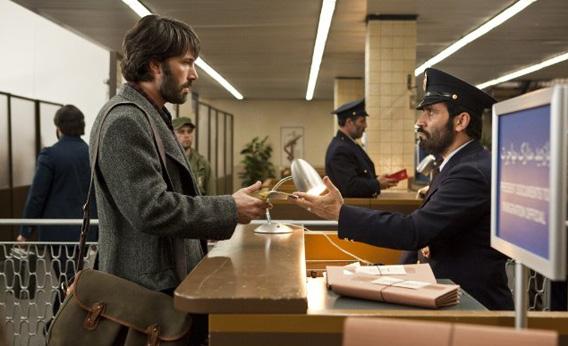Ben Affleck noted in one of his publicity interviews for Argo that teenagers seeing the film not
only probably have no historical context for the events depicted within, but
probably don’t even realise the whole “Matt and Ben” thing that typified his
rise to fame in the late 90s.
Aside from making me feel incredibly old, it also underlines
how far Affleck has come since Forces of
Nature seemed like a pretty solid career choice (to be fair, I did not hate
that film). It’s redundant these days to talk about Affleck’s skill as a
director after the double artistic successes of Gone Baby Gone and The Town,
but let’s do it anyway. Argo is just
that good a film that Affleck probably deserves a bit of critical fellatio for
having made it.
Argo’s a bit of a
break for Affleck, given that his two previous features took on the
do-what-you-know mantra and delved into Bostonian subcultures and it feels as
if Affleck is enjoying the longer leash given that Argo sprawls across the globe with major sequences in at least
three different countries.
 |
| Let's hear it for Hollywood... Tony Mendez meets with Tinsel Town veterans to fill out the back story of Argo |
As you probably know by know, Argo is a loose re-telling of the fabled “Canadian Caper” on 1979 in
which six American consular staff members where smuggled out of the Canadian
Embassy in Tehran
during the height of the Iranian Hostage Crisis with the bold cover identities
of being crew members for a science fiction film – entitled Argo.
Affleck centres the story around chief extractor Tony Mendez
(played by Affleck himself) who has the somewhat gargantuan task of convincing
not only Washington brass to let him move ahead with a plan that even he
regards as ludicrous but also the stranded diplomats themselves, who are none
to keen to put their lives on the line for a plan they don’t see as possibly
working.
 |
| Fortunately the actors playing the diplomats are more confident performers than their characters |
The set up is rife with tension and the ongoing conflicts
and cooperation between Mendez, the sequestered Americans, the American
government, the Hollywood experts lending authenticity to the plan and the
Canadian Ambassador (Victor Garber) allow for rich dramatic mining that is
satisfyingly complex enough that it never needs to veer into melodrama. Even from as early as co-writing Good Will Hunting, Affleck has understood that its better to focus on the narrative and drama of interaction than to rely on gimmicky spectacle to get by. Yes, we're pretending Armageddon didn't happen. And Daredevil.
Of course, given the high stakes situation Argo
isn’t just a talkfest and the all of that narrative development is complemented by tense sequences as the characters and their tenuous existence are put under threat of discovery by increasingly suspicious Iranian forces.
It’s worth noting that Affleck is a filmmaker at this point
rather than a historian and though the mise en scene lovingly recreates the late
70s, Affleck does take considerable liberties with the facts. The role of the
Canadian government in securing the diplomats’ freedom is almost completely
overlooked in Argo and the original
cut even implied that Canada
ultimately took credit for the USA’s
work. This has been minorly remedied with the current theatrical cut after it
caused some consternation at the Toronto International Film Festival, but it is
worth going in knowing you won’t be getting the full story.
Likewise, several of the tense sequences later in the film,
in particular the airport sequence, are gross overstatements of how events
actually unfolded.
I will give Affleck full credit here though. When confronted
with these departures from fact he was very upfront about the role of a
filmmaker in needing to make decisions about how events are depicted in a w ay
that will be satisfying to audiences.
 |
| Anything to declare? |
And it works. By the time the rescue is finally effected
(sorry if that’s a spoiler), the tension is sky high and the relief at its eventual
dissipation is elating.
If there’s one thing that disappointed me about Argo (and I am really nitpicking here)
is that we don’t get much of a sense of the inner workings or motivations or
the Iranians during this time. Argo
is unashamedly a pro-American film, which may explain why the Canadians are so
obscured, but its confusing for someone who was four months old at the time of
the events as to why the Iranians are merely portrayed as villains when there’s
enough info in the film to suggested there’s a broader context we’re just not
allowed to spend any time with.
For all of that, I think Argo
will be the one to watch come Oscar season (I’m tipping The Master for performances and Argo
for writing/direction) and, presuming it wins, will absolutely deserve it.
No comments:
Post a Comment